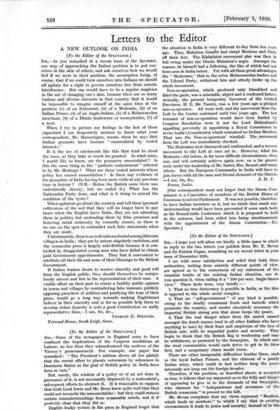Letters to the Editor
A NEW. OUTLOOK ON INDIA
[To the Editor of the SPECTATOR.]
Sin,—As you remarked in a recent issue of the Spectator, one way of approaching the Indian problem is to put our- selves in the skin of others, and ask ourselves how we would feel if we were in their position, the assumption being, .of course, that if we could turn ourselves into Indians we should all agitate for a right to *govern ourselves free from outside interference. But one would have to be a regular magician in the art of changing one's skin, because there are so many various and diverse interests in that country that it would be impossible to imagine oneself at the same time in the position (1) of an Extremist, (2) of a Moderate, (8) of an Indian Prince, (4) of an Anglo-Indian, (5) of a Mohammedan merchant, (6) of a Hindu landowner or moneylender, (7) of a ryot.
When I try to picture my feelings in the last of these capacities I am desperately anxious to know what' your correspondent, Mr. Ramanujam, means when he says that Indian peasants have become " emasculated by vested interests." • It is the use of catchwords like this that tend to cloud the issue, as they take so much for granted. In what sense, I would -like to know, are the peasantry emasculated ? Is this the same thing as the " pathetic contentment " referred to by Mr. Montagu ? What are those vested interests whose policy has caused emasculation ? Is there any evidence of the peasantry of India having been more virile at any previous time in history ? (N.B.—Before the British came there was undoubtedly slavery, but we ended it.) What has the Nationalist Party done, and what is it doing to amend the condition of the ryots ?
When agitators go about the country and tell these ignorant cultivators of the soil that they will no longer have to pay taxes when the English leave India, they are not educating them in politics but misleading them by false promises and fostering racial animosity by cowardly means, as there is no one on the spot to contradict such false statements when they are made.
. Unfortunately, there is no well-informed mind among illiterate villagers in India ; they are by nature singularly credulous, and the vernacular press is largely anti-British because it is con- trolled by disappointed young men who have failed to obtain paid Government appointments. They find it convenient to attribute all their ills and none of their blessings to the British Government.
If Indian leaders desire to receive sincerity and good will from the English public, they should themselves be scrupu- lously sincere and fair in the representation of their ease. A visible effort on their part to create a healthy public opinion in towns and villages by contradicting false rumours, publicly opposing preachers of sedition and purifying the tone of their press, would go a long way towards making Englishmen believe in their sincerity and so far as possible help them to develop (what dyarchy is not) a good Constitution on really representative lines.—I am, Sir, &c.,






































 Previous page
Previous page